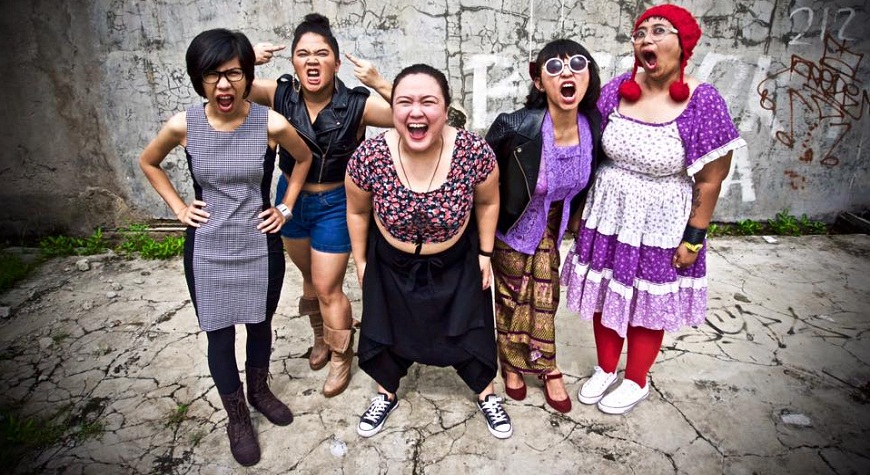That Indonesia – as are many countries across the globe – is in a state of emergency when it comes to gender-based violence correlates with the fact that women’s bodies are still largely objectified and abused. At the least, women’s bodies are constant targets of criticism and scrutiny, whether driven by unrealistic ideals of beauty standards or by the presumptions that they can cause moral degradation. All these are the biggest obstacles to women’s complete authority over their own bodies.
This was the premise that triggered a collective of five Indonesian women to start “Mari Jeung Rebut Kembali”, an initiative that champions body positivity and body authority among women.
Borrowing from the popular maxim “mari bung rebut kembali”, which is taken from the lyrics of an anti-colonial song, they replace the original word “bung”, (the equivalent of “bro” in the revolutionary time) with “jeung” (colloquial for “sis”). Like the original saying, “Mari Jeung Rebut Kembali” is a call to take back and reclaim something. If national sovereignty was the aim back then, now what’s at stake is a woman’s individual freedom to rule her own body.
The collective is made up of a group of feminists: musician Kartika Jahja, musician and founder of Bracode magazine Savina Hutadjulu, gender activist and social media strategist Shera Rindra, artist and initiator of underground creative activism Ika Vantiani, and lecturer and musician Teraya Paramehta.
The project was inspired by a track in the newly launched album of Kartika’s band, Tika and the Dissidents, and it was launched as part of the celebration of the International Women’s Day during the Festival Tubuhku Otoritasku (My Body, My Authority Festival) on Friday (March 11). The festival highlighted many issues regarding women’s bodies, as well as celebrated diversity and encouraged a sense of self-authority to women.
“Violation on a woman’s body, whether verbally, physically, or sexually, is done by people who have no understanding of body authority. We need to acknowledge that a woman’s body doesn’t belong to the state, the society, the family. It belongs only to herself,” Tika, as Kartika is popularly known, said in an interview with Magdalene.
The Friday’s festival featured a number of acts, including art installations, music performances and open-mic performances, but the highlight was the release of the music video of Tubuhku Otoritasku. The music video features the five Mari Jeung Rebut Kembali initiators as well as 29 other women of diverse ethnicities, races, religions, social classes, ages, body shapes and sexualities – all representing the unique narratives of their bodies.
“Through the video project we aim to give a message and educate people, not by presenting it in depressing and frustrating tone, but rather with an empowering dialogue to firmly reclaim each of the women’s version of body expression,” said Shera.
One of the women featured in the video, interior designer Theresia Indra, talked about how she likes to express her body differently: “The song talks about how women are often judged for not conforming to the idealized beauty.”
“In the video, I’m the one with the saying ‘Tubuhku, Ekspresiku’ (My Body, My Expression) written on my skin, because I always prefer to be different. I want to express myself freely and distinctively, I’d like to dress the way I want to, I dyed my hair pink. I hate to have the same style with everybody else. I believe that all women shouldn’t be restricted to explore their own styles and identities, or be judged because of it,” she said.
Women’s bodies, particularly, are not only sexually objectified by men but also highly prone to scrutiny by other women.
“Somebody commented on my appearance once, saying ‘Cover up your body! It makes me sick’,” Tika recalled her experience.
Shera dismissed the oft-cited argument for women to cover up their bodies because it is the Eastern – thus Indonesian – culture, citing Indonesia’s history actually proved contrary.
“The fact is there was no such rule on clothing, because women’s bodies were not sexualized the way they are now. So to those who think that not covering our bodies means we are adopting the Western culture, they should read history books again,” said Shera, adding wearing headscarf is, on the other hand, a tradition adopted from the Middle East.
But by no means the movement is trying to pick up fights with conservatives.
Said Tika: “I genuinely have no problems with the conservatives, but just don’t be a conservative asshole.”
In the campaign, the collective also stresses that the movement is not about discrediting or discriminating specific groups of women.
“We are not trying to say that fat is better than thin, or not wearing headscarf is better than wearing it. We embrace all. We focus on telling women that here is your body – whatever you do with it, make sure that it comes from you, not everybody else,” Tika said.
Recalling her experience producing the music video, she said she found out that women who wear hijab actually receive more critics and harsher comments from people.
“I thought that once I covered up my body, the problem would be solved, but not really. As a matter of fact, women who wear headscarves are scrutinized even more,” said Tika.
One of the women in the video who wear her headscarf in a certain style recounted being told by her friend that she would be sent to hell anyway for not wearing it properly. Another woman was told that she shouldn’t wear a headscarf at all, if she kept putting on make-up.
Although the campaign has mostly received positive feedback, there were some negative comments.
“Some said that the issue was not that important, others said we should just help rape victims directly,” Tika said.
“One even said that it caused erectile dysfunction.”
But any feedback is valuable to the campaign. The negative ones give them more reasons to continue the campaign, as it is only a reflection of the reality.
“We’ll take further steps and continue to promote body positivity and raise awareness of body authority. We certainly won’t stop here,” Shera added.
Watch the music video "Tubuhku Otoritasku" here:
*Illustration by Mari Jeung Rebut Kembali, taken by Nicky Yuventius
Read Ayunda’s report on Australia’s strategy to help gender equality in the region.









Comments